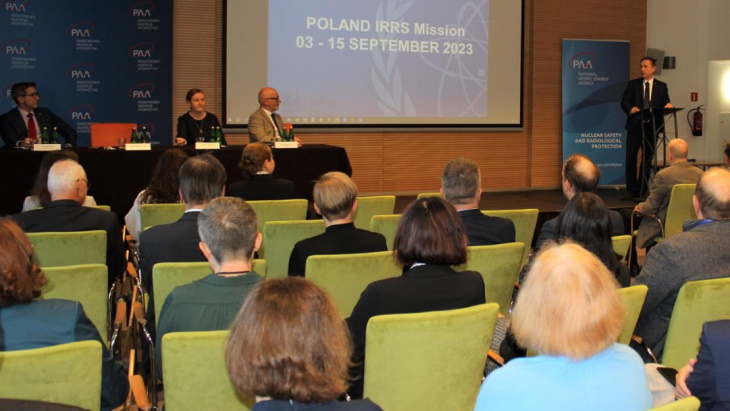
An Integrated Regulatory Review Service (IRRS) mission to Poland took place from 4-15 September at the request of the Polish government and hosted by the country's National Atomic Energy Agency (Państwowa Agencja Atomistyki, PAA). The mission team was made up of 15 senior regulatory experts from 14 countries, as well as four IAEA staff members and one observer from the European Commission. It was the second IRRS mission to Poland, following one held in 2013.
IRRS missions are designed to strengthen the effectiveness of the national nuclear and radiation safety regulatory infrastructure, based on IAEA safety standards and international good practices, while recognising the responsibility of each country to ensure nuclear and radiation safety.
The team concluded that the PAA was a competent regulatory body whose staff are committed to delivering their regulatory statutory obligations effectively and to prepare to embark on a nuclear power programme in line with international safety standards.
"This is a major milestone for Poland, which has been considering a nuclear power programme for many years. The PAA's commitment to safety, as demonstrated throughout this second IRRS mission, is essential to ensuring that any nuclear power plants built in Poland are operated safely and securely," said Mike King, Deputy Office Director for Reactor Safety Programmes and Mission Support at US Nuclear Regulatory Commission and the IRRS Team Leader.
The team said the Advanced Licensing Exercise Project conducted by the PAA in 2018-2019 was considered good practice. This was a simulation of the analysis of a nuclear power plant construction licence application, carried out with the participation of international experts. The team said it enabled the PAA to enhance its competencies for the licensing of a nuclear power programme, to identify priorities for further developing the safety infrastructure and to better prepare for several practical issues that may be encountered during licensing of the first nuclear plant in Poland.
In addition, the team identified good practices and performances conducted by Poland, including: the training of 300 Regional Sanitary Inspectorates staff on how to effectively inform the public on radon related issues; the communication strategy of the PAA to interact effectively with its interested parties, including information published on its website in relation to the conflict in neighbouring Ukraine; and the installation of 30 additional radiation monitoring stations close to its border to improve radioactivity detection capability.
The IRRS team concluded the main challenge in Poland was to implement robust measures to ensure that the PAA is effectively independent and continues to be properly resourced. Additionally, the team said the government should: ensure the availability of financial resources to enable the timely decommissioning of research reactors; improve coordination and cooperation between different regulatory authorities with responsibilities for facilities and activities in Poland; address the need for additional medical physicists for ensuring radiation protection of workers, patients and the public in medical treatments using radiation; and provide the PAA with the authority to amend licences on its own initiative without the documented consent from the authorised party. The team also recommended the PAA establish an integrated overarching human resource plan, including the identification of financial resources to implement it.
"We would like to thank the IRRS team for their intensive work during the last two weeks, the results of which will help us to further enhance the overall effectiveness of the regulatory system in Poland," said PAA President Andrzej Głowacki. "The PAA has been identified as a competent regulatory body with staff committed to deliver their regulatory functions effectively. It will allow Poland to safely develop its nuclear power programme."
The final mission report will be provided to PAA in about three months. Poland plans to make the report public.
Poland currently operates a single research reactor, MARIA, has a research reactor, EWA, under decommissioning and two used fuel storage facilities, all located in Otwock, near Warsaw. Industry, medicine and research applications of radioactive sources are widely used. The National Radioactive Waste Repository, located in the town of Rozan, is a near-surface repository for radioactive waste and sealed radioactive sources disposal operated by Radioactive Waste Management Plant.
Construction of Poland's first nuclear power plant is planned to begin in 2026 at Lubiatowo-Kopalino in the province of Pomerania. As set out in Polish Nuclear Power Programme, there will be up to six reactors in two or three locations in the country with total generation capacity of 6-9 GWe. The aim is that all units will be online by 2040.